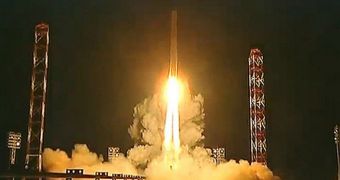Yesterday, November 8, the Russian Federal Space Agency (RosCosmos) managed to successfully launch its Phobos-Grunt mission to the Martian moon Phobos. Unfortunately, the spacecraft failed as soon as it reached Earth's orbit.
RosCosmos officials say that the main thrusters aboard the probe failed to ignite properly. At first, Mission Control couldn't even find Phobos-Grunt in orbit. After experts finally identified its location, they noticed that it was simply drifting in space, without active propulsion.
Russian officials are not desperate yet, however. They say that the probe may very well be recovered in the end, even if it failed to enter its proper, Mars-bound orbit. The launch window for launches to the Red Planet is opened until December 18, 2011, Space reports.
What this means is that this is how long the space agency has before it can no longer send the mission towards Mars. Russia has been plagued by bad luck on all mission it attempted to send to the Red Planet, and many feared that the streak will not be broken with the new launch.
Phobos-Grunt is the first attempt RosCosmos makes to send a robot to our neighboring planet in about 20 years. Regardless of subsequent advancements in technology, the probe now lies dead in the water. Engineers have no idea about what happened, and why.
The spacecraft launched at 2:16 am local time on Wednesday (2016 GMT Tuesday), from the Baikonur Cosmodrome, in Kazakhstan, and had more objectives than simply collect pebbles from the surface of the diminutive Martian moon Phobos.
“The major outcome is that Russia might establish its credibility again. It would open the door for major international missions,” Roald Sagdeev said before the launch. The official is the former director of the Space Research Institute (IKI) in Moscow. He gave this statement for the journal Nature.
However, these hopes were shattered as soon as Phobos-Grunt reached orbit. “It has been a tough night for us because we could not detect the spacecraft. Now we know its coordinates and we found out that [its] engine failed to start,” said RosCosmos Chief Vladimir Popovkin, quoted by RIA Novosti.
“We will attempt to reboot the program. The spacecraft is currently on a support orbit, the fuel tanks have not been jettisoned, and the fuel has not been spent,” the top Russian official went on to say.
He added that engineers with the space agency only have about three days to figure out what to do with Phobos-Grunt. After that time, the spacecraft will run out of battery power, and will turn into a $163-million piece of space junk.

 14 DAY TRIAL //
14 DAY TRIAL //